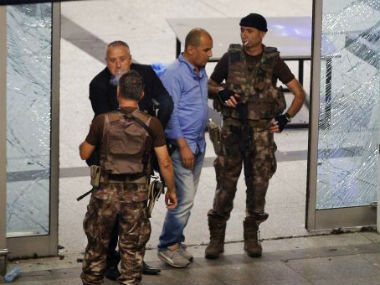At root, last week’s Brexit vote and Wednesday’s horrific terrorist attacks at Istanbul airport are manifestations of the same trend: The world is fragmenting into narrow segments filled with hate and fear of others. The same phenomenon animates Donald Trump’s campaign to become US president, and the minds of his vast number of supporters. It is easy to categorise the Brexit vote as an exercise in democracy, and the Istanbul attack as terrorism and more — and to view them as unrelated. Such neat pigeonholing would not be wrong. But it would fail to take in the big picture, the frightening story of the hate and fear that is tearing our world apart. To some extent, such trends fuel each other. A certain sort of view of ‘Islamic terror’ is among the factors that have given strength to the Trump and Brexit campaigns. This fear has been exacerbated across Europe after the ‘refugee crisis’ that has brought close to two million new residents to the continent from Syria and Iraq over the past year. [caption id=“attachment_2863464” align=“alignleft” width=“380”] Security has been beefed up at the Ataturk Airport in Istanbul after Wednesday’s attack. AP[/caption] On the other hand, narratives of vile and horrifying torture in Iraqi prison camps run by the West, and the gruesome and often lethal effects of Western drone attacks on children and other civilians, give salience to those who plan, execute and support attacks such as
those that took 42 lives and injured hundreds at Istanbul’s bustling airport on Wednesday . The effect of both sets of narratives is to promote an understanding of the world as containing good people like ‘us’ who are under vicious, unfounded and indefensible attack from ’them’. The ‘other’ imagined as ’them’ are viewed as evil. This evil could be seen in the shape of an overwhelming and oppressive geopolitical power — an ’empire of evil’. In some fear-filled minds, the ‘other’ could take the shape of a vile religion and its hate-filled followers. It could be imagined as ‘outsiders’ taking over ‘our’ country, jobs and welfare schemes. Whether in Turkey, Russia and Hungary or in the US, Britain or Holland, it is a trend that is taking over minds and hearts across our world. It is bringing to power regimes that would have been widely considered unacceptably xenophobic just a few years ago — certainly a generation ago. The essential ideas of inclusivity and tolerance which animated the processes of globalisation have been the chief casualties of these trends. So far, it was possible to view events that pointed to this trend as isolated incidents. At this point, it is becoming difficult to ignore the extent to which the dam of inclusivity has been damaged. For several decades, that dam held in check the more instinctive, impromptu reactions of anger and resentment that seem normal to many. There is ample evidence that shrinking economies and fund-starved education systems have contributed to this trend. It is surely not a coincidence that the economically buoyant western part of Germany – one of a shrinking number of countries that is still largely committed to state-financed education from the primary to the highest levels — has been among the least affected by this trend. Nor is it coincidental that racism and xenophobia have grown in many parts of eastern Germany, where the economy is sluggish and many people’s hopes following Germany’s 1991 reunification have been disappointed. Across many parts of the world, media channels that pander to narrow nationalism and engage in deliberate fear-mongering have added much strength to this trend towards intolerance. Populist discourses on social media platforms add fuel to the fire. Such platforms are often a vent for the unemployed, many of whom have faced challenges in education and the development of skills. The time has come to take a cold hard look at the havoc these trends — in economies, education and the media — are wreaking. It might already be too late, but one thing is becoming increasingly clear: Unless we work together dedicatedly to pull back from this precipice, the world as we know it could come apart in terribly unpleasant ways.
At root, last week’s Brexit vote and Wednesday’s horrific terrorist attacks at Istanbul airport are manifestations of the same trend: The world is fragmenting into narrow segments filled with hate and fear of others.
David Devadas is an expert on politics and geopolitics. Formerly a Senior Fellow at the Nehru Memorial Museum and Library, Visiting Professor at Jamia Millia Islamia, and Political Editor of Business Standard, he is currently Distinguished Fellow at the Institute for Social Sciences. He has written books on Kashmir, on youth, and on history. He has been a radio compere, guest faculty at JNU's Academic Staff College, St Stephen's College and Hindu College. He has worked for the Indian Express, The Hindustan Times, India Today, The Economic Times and Gulf News. His most impactful article, on a murder cover-up, prevented a Congress President from becoming prime minister. One led to the closure of an airline, and another created a furore and consequent clean-up in Delhi's health department. Several have correctly predicted election results in key states, and a series of reports from Srinagar made the government aware of how unsettled the situation there was in 1990. He is an alumnus of St Xavier's School, St Stephen's College, and the Indian Institute of Mass Communication. He has lived for extended periods in Geneva and Berlin, and has traveled to almost 50 countries. He enjoys various kinds of music, theatre, design, architecture and art. see more


)

)
)
)
)
)
)
)
)



